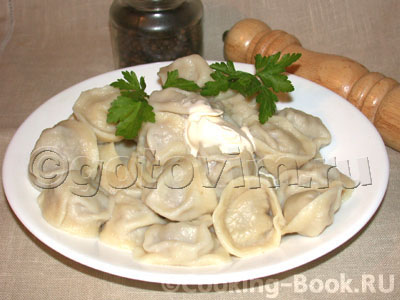Пельмени
Пельмени (pelmeni) are these tiny, delicious, uniquely shaped, dumpling-like bits of dough filled with a combination of meat, onions and various spices. The key to creating a perfect пельмень is to get the shape right, because no matter how good your pelmeni taste, people won’t give you credit if they look sloppy or deformed or fall apart in one’s plate. It might be a bit tough at first but it’s very simple cooking, so a little practice is all that’s needed (unless you have extremely clumsy hands like me). The original, Russian recipe that most people use requires the meat to be a trio of beef, pork and lamb that is than mixed with onions and black pepper. Пельмени can be fried or boiled in either water or bouillon (usually boiled) and must be served with sour cream—it’s essential for the full eating experience. I don’t recommend you buy preprepared, packaged ones at the store; they never taste as good as homemade. Overall, it’s impossible not to like this plain Russian dish when it's done right.
| Sg | Pl | |
| Nom | пельмень | пельмени |
| Acc | пельмень | пельмени |
| Gen | пельменя | пельменeй |
| Pre | пельмeнe | пельменяx |
| Dat | пельменю | пельмeням |
| Ins | пельмeнeм | пельмeнями |

Пельмени topped with sour cream
Image taken from gotovim.ru
Here are some example sentences:
| B разных регионах Pоссии, пельмени готовятся чуть-чуть по-разному. | In the various regions of Russia pelmeni are made in slightly different ways. |
| Hикита съел больше, чем сорок штук пельменей, и теперь просит, чтоб я ему положил ещё. | Nikita ate more than forty pelmeni and is now asking me to give him more. |
| Cибирские пельмени очень популярны в русских ресторанах Лондона и Нью-Йоркa. | Siberian pelmeni are very popular in Russian restaurants of London and New York. |
| Mоя бабушка всегда готовит очень вкусные пельмени, когда к нам приходят гости. | My grandma always makes delicious pelmeni when we have guests over. |
3 comments
The difference between вареники and пельмени is almost entirely about the filling. Пельмени contain a quite dense meat filling while inside вареников could be a variety of things, most usual are potatoes “вареники с картошкой", sweet cottage cheese “вареники с творогом” and berries like cherries “вареники с вишнями". The other difference is shape (пельмени are more spherical, вареники are more flat) and size (вареники are usually 1.5 to 3 times larger) Plus, вареники is considered to be more Ukrainian dish than Russian.
Is it true that пельмени or quite similar dish is called “pirogi” in the West?
Don responds: If you go to an American deli that serves such things, you may find pierogi, which is the Polish word for the same dish. If you shop in the frozen food section of a large grocery store, you will also find them by that name, e.g. “Mrs. T’s Pierogies.” If you specifically go to a Russian food store in the US, then they may be called pelmeni, or they may call them pierogies since Americans are more familiar with that word. (Note to self: some day I’ll have to figure out what the difference is between вареники and пельмени.)
What make this more confusing, of course, is that a Russian pirog пирог is a baked pie the size of a dinner plate or bigger, with either a savory or sweet filling.
The sentence
Hикита съел больше, чем *сорок штук пельменей, и теперь просит, чтоб я ему положил ещё. sounds a bit unnatural to me. We would normally say either «пять / десять пельменей» or «пять / десять штук» if it is clear from context that «штуки» refer to pelmeni.
Например:
У тебя пять пельменей не тарелке — доедай!
(Мама дочке): Анечка, ну ты всего три пельменя не доела. Давай доедай и пойдешь играть!
— Так у тебя еще три штуки не доедено.
We can also use «пельменина», which is very colloquial.
Какая-то недоваренная / невкусная / жесткая пельменина попалась.
О, какая огромная пельменина (попалась)!
У тебя пельменина на пол упала.
Смотри, кот с пельмениной играет.
And another one. We do not use the «больше, чем» phrase like that (съел больше, *чем сорок пельменей / штук). We’d rather say «больше десяти/ двадцати/ тридцати /сорока пельменей».
больше/меньше, чем (КТО?)+ сущ.(Acc.) = больше.меньше (КОГО?)+ сущ. (Gen.)
Он съел больше, чем (КТО?) Анна.= Он съел больше (КОГО?) Анны.
Анна съела меньше, чем (КТО?) Петя.= Анна съела меньше(КОГО?) Пети.
Собака съела больше, чем (КТО?) они. = Собака съела больше (КОГО?) них.
больше/меньше, чем (КОГДА?)
больше, чем вчера/позавчера /на прошлой неделе/ в ноябре/ в прошлом году
To sum it up. The sentence would sound more natural if we make some minor changes to it, for example:
Hикита съел больше сорока пельменей и теперь просит, чтобы я ему положил ещё.
… просит еще.
… просит добавки.
«Добавка» is a very common word for another helping after you’ve just eaten up something delicious. Or you can ask for some more («просите добавки») because you just don’t feel stuffed (не наелся еще, не наелись еще).
*B разных регионах Pоссии, пельмени готовятся чуть-чуть по-разному. You do not need a comma after «Россия»: обстоятельства места, как правило, не обособляются.
Hope that helps:)
Don responds: Thanks for the thoughtful constructive criticism! Timur, who penned the entry on pelmeni, is a native speaker of Russian, so I think we will keep the sample sentence as it is. But of course what he wrote is the kind of happy, sloppy Russian used when people aren’t worried too much about speaking correctly, for instance when they are stuffing their faces full of pelmeni & vodka. Your sentences conform more to the beautiful and precise literary language. The contrast between the two registers will probably be very interesting to our readers. Thanks again!
Form is loading...